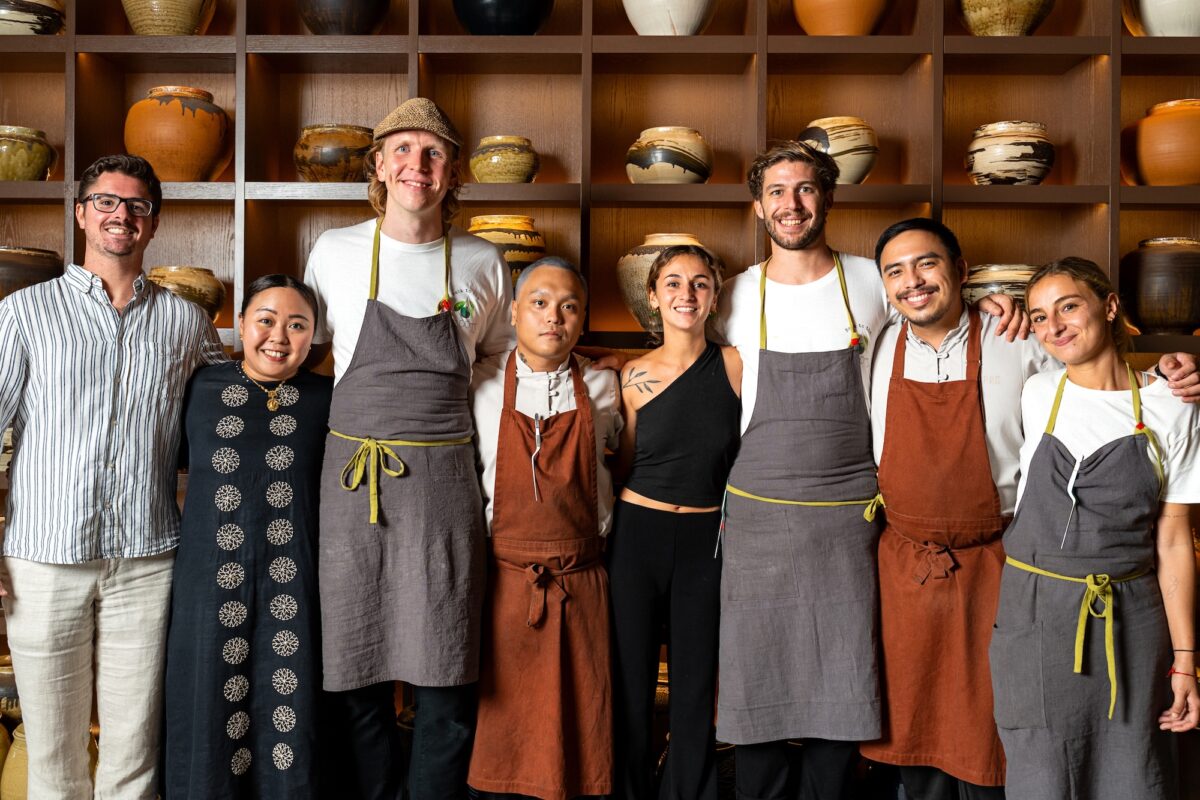Juana Manahan-Yupangco has discovered the secret to healthy eating and she has no plans of keeping it to herself.
Hidden in plain sight, locally grown vegetables are the key to a sustainable plant-based diet. Aiming for increased awareness of this fact, it is an advocacy that she is keen on communicating to others. In particular, to those who are either hesitant on pursuing such a lifestyle based on its perceived cost, or those who’ve restricted themselves to the consumption of imported vegetables and superfoods believing they’re the best option around. No, not only are native vegetables cheaper in price, but they are also just as good, if not better, than their international counterparts; a message she continues to share through the non-profit organization, Mesa ni Misis.
Finding her way to the kitchen, Manahan-Yupangco first discovered her inclination to cooking as a kid when she, alongside her sister, would bake cookies and sell these to her father who gave them away at the office. She recalls having a deep curiosity and appreciation for all kinds of flavors, leading her to explore and experiment without formal instruction. “I never read a cookbook. I like food and the taste of certain things, so I’d imagine certain flavors, get the ingredients, and then execute it when I was a kid.”
Evidently, she was never restricted to following the norm, the correct way of going about cooking—during our conversation, she recounts having once made sinigang in her coffee maker because she didn’t have a pot; an experience she does not recommend to anyone unless you’d want “your coffee to taste like sinigang for weeks.”
But as to why she enjoys cooking, it all goes back to her love for it. “I love seeing my family’s faces, or people’s faces when I make food. I feel like it’s my love language to cook for people.”

From that simple love for cooking, and after her husband was diagnosed with having high cholesterol levels, which prompted a change in diet in their household, she would eventually create Mesa ni Misis. But beyond just being a renowned cookbook containing 40 plant-based recipes that highlight native vegetables, Mesa ni Misis is an organization dedicated to helping families make healthy choices.
They’ve embarked on a number of feeding programs and even held workshops where they dispelled any preconceptions concerning vegetables and introduced the plant-based diet to groups that were unaware of the viability of eating healthily while on a budget. Moreover, during the pandemic, they’ve also expanded to also bringing vegetables closer to families through Market ni Misis when they brought fresh produce from areas outside Manila to barangays that had an imposed lockdown.
Years after she first started out on this journey, Manahan-Yupangco is still driven by the same joy she found in the people she cooked for that led to her venture outside her own kitchen in the first place—at this point, making a difference in one household at a time is all that matters to her. “I think that’s the most rewarding part – being able to make a difference, no matter how small or seemingly insignificant.”
I think that’s the most rewarding part – being able to make a difference, no matter how small or seemingly insignificant.
The Road to Healthy Eating

As it goes with any changes to one’s lifestyle, it’s always difficult in the beginning; after all, you’re doing away with what you’ve grown accustomed to; old habits die hard as they say. But with Manahan-Yupangco, the move to a plant-based diet was relatively easy. She remembers her spurred interest to coincide with its emergence as a widespread trend. During that time she delved into research and discovered the numerous benefits associated with vegetables and the respective disadvantages other sources of food carry with them. For her, going all in on the plant-based diet was inevitable, it was just a matter of time.
A concern that typically arises when moving to such a diet, or when eating vegetables in general, is its flavor, especially since some are known to be quite bitter and bland; a problem that you would never find eating meat. A capable cook in her own right, this was never an issue with her and this made the adjustment even easier.
“The transition for me was not bad. I used the skills that I learned in making meat-based dishes into plant-based dishes—I just transferred the flavors, and the techniques onto vegetables and it was still enjoyable, it was still tasty for me.”
And through sheer repetition and the belief in what she was doing, it’s no longer a matter of discipline, not a chore that she has to drag herself to get it over with, it’s second nature – for her and even her family.
“I’d say it’s second nature to me already. I hardly ever buy fish or chicken, maybe, if there’s a special occasion for someone in the family. It definitely took a while for me and the kids, and the husband to be used to just having vegetables, but now, it’s absolutely second nature to all of us.”
From Her Kitchen to Those of Others: Mesa ni Misis

But the transition from cooking for her family to cooking for others was spurred by seeing the impact healthy eating had on someone with a dire health condition. She recalls an instance when a staff member working with her family got sick; he had become practically blind due to diabetes. Through a drastic change in diet, effectively going plant-based, his condition reversed, showing no signs of ever becoming ill. Brought to curiosity by these results she asked him what he ate in exchange, to which he replied, “Simple lang, basta may konting lasa, okay na.” (It’s simple, anything with taste is okay).
And through that experience, she came to realize that eating healthy was possible for others—if he could do so with his budget—why can’t others—if only they knew. It changed her mindset from living to eat to eating to live, a matter of sustenance rather than purely for the sake of enjoyment. But despite that, she acknowledges the prevailing prejudice against vegetables; consumption was identified to be less than the 400 grams per day recommended by the World Health Organization (WHO). In response to that, flavor she thought, was what she had to address.
“That’s my main thing: Make it taste good. Make it interesting. Make it taste different for people to try it. You don’t need to spend so much to be healthy and eating this way also prevents you from spending a lot later on in life.”
You don’t need to spend so much to be healthy and eating this way also prevents you from spending a lot later on in life.

Regardless, as it is with introducing any ‘foreign’ concept to a crowd, she was met with resistance and had to overcome a number of obstacles to deliver her message to an audience that has grown accustomed to traditional Filipino dishes; those with a taste for the sweet and savory—Adobo, Caldereta, Lechon, the list goes on, even our infamous sweet spaghetti. With such an emphasis on meat as the central piece of any dish, introducing vegetables as the main dish is an incredible feat, given that these are usually served on the side or as a supplement to any protein.
“The hardest thing was arguing against the notion that you’re not gonna get full by eating that. That was a very difficult thing to overcome and it still is. When people see that your main dish is just gulay (vegetables), they’d think that they’re going to be hungry which is not true.”
And along with that is also having to dispel any myths concerning vegetables.
“The biggest myth I’ve had to dispel is that beans cause uric acid. It’s really not true. In fact, PGH came out with a pamphlet years ago and it’s in circulation. Doctors know about it so it’s not some foreign concept, and yet, Filipinos still think beans cause uric acid. So, the next question is ‘Where does it actually come from?’ It comes from meat, it comes from artificial flavorings, and high fructose corn syrup, all of which are present in everything that we eat.”
Manahan-Yupangco believes that with any success they’ve encountered, a massive contributor has been the authenticity with which they have presented their dishes. When you talk about plant-based meats, these oftentimes only serve to prove that they’re nowhere close to what they’re imitating; burger patties made out of tofu and lentils as a substitute to ground meat—it’s a pale imitation.
“I don’t claim to make all my food a vegetable version of a meat dish because it’s never going to be the same. The flavors alone from the meat itself are different, you won’t get that from a plant-based dish. I never do that, I just call it what it is.”
I don’t claim to make all my food a vegetable version of a meat dish because it’s never going to be the same. The flavors alone from the meat itself are different, you won’t get that from a plant-based dish. I never do that, I just call it what it is.
Choosing Healthy Eating

If you are at a crossroads concerning your health and wellness journey, wondering if you should pursue a plant-based diet, she offers more insight into its benefits for you to consider:
“Meat has no fiber and plants are all fiber and you need that to lower your cholesterol levels and keep your body functioning properly.”
“When it comes to protein, meat has higher values of protein compared to beans or other plant-based sources so it’s not great to eat a lot to replace it. But, the good news is: you don’t actually need that much protein in your body. In fact, your weight in pounds times 0.8 is the amount of protein that you need to live. So, it’s not very much, for me, it’s 48 grams of protein a day and that’s it.”
Its benefits even extend to addressing illnesses and conditions specific to women:
“Plant-based diets are very good in combating PCOS. If you read any literature concerning it, you’ll be told to decrease your intake of meat because it is inflammatory and vegetables are not. In fact, they lower – they calm it down – it reduces inflammation. It may even lower the risk of breast cancer.”
Needless to say, it’s wise to not blindly follow any popularized diets you come across, regardless of the benefits they claim to have. What works for others may not necessarily work for you. It’s always safe to do your due diligence and consult your doctor before embarking on a diet you’ve never tried before.
But with all the discussion surrounding undergoing a plant-based diet, a regimen noted to require the utmost discipline and dedication, she maintains that a healthy diet need not be so strict.
“Just be patient with yourself. There’s a saying, ‘Eat less but eat more plants.’ It’s all about reducing your meat intake and not necessarily having to cut it out completely. There are still a lot of health benefits for your body by just simply lowering your consumption of meat.”

Juana Manahan-Yupangco remains firm in her belief that a healthy and fulfilling lifestyle can be afforded to anyone; all it takes is an open mind to realize that the best option available can simply be found around us; you need not look further. With every recipe written and kitchen inspired, slowly but surely, there is no doubt that her vision will come to be realized.
—
A new Mesa ni Misis cookbook is set to be released within the coming months.
You can follow her on Instagram at @mesanimisis.










































